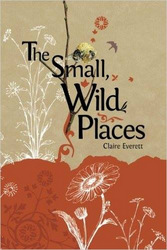The Small, Wild Places by Claire Everett (Skylark Publishing: Yorkshire,
England, 2015)
|
A confession upfront: I’m incapable of offering an unbiased or
critical assessment of this enchanting book. Before buying and reading it,
I was already enamored of Claire Everett’s writing, having discovered
serendipitously her haibun and tanka tales in journals such as A Hundred
Gourds, Contemporary Haibun Online, and Haibun Today. Here
are only two of numerous examples I could present from those publications
that resonate for me:
|

Skylark Publishing
|
And so began your love of words. I spooned you the best I had and soon you
were feeding yourself, tucking in like a trencherman, with a pelican bib
to catch what you missed. You learned of a hunger that can never be
filled...
(“Hand-me-downs”)1
...The expressions known only to us, spoken like charms. This, the comfort of rituals,
the invisible cord that binds our loose-leaf days. If there is a god of small things,
I imagine this is how he is appeased. They will surely come, those other days,
the ones that knock us sideways. But let’s not think of them now...
(“Small Comforts”)2
Claire Everett is founder and editor of Skylark Tanka Journal, as well as
Skylark Publishing, both based in Yorkshire, Northern England. Her second collection of
tanka, The Small, Wild Places, which contains 157 individual tanka plus four
tanka sequences, was released by Skylark Publishing in 2015. The poems were selected
and sequenced by David Terelinck, author of Casting Shadows and Slow
Growing Ivy, who also wrote the in-depth foreword. The book concludes with brief
commentaries by Susan Constable, tanka editor of A Hundred Gourds, and Joy
McCall, author of four poetry collections including Hedgerows: tanka
pentaptychs. The gorgeous matte cover was designed by Claire’s son Owen
Smith.
the son who knows
that ink can heal, who dreams
with open eyes
tells me there’s a moth that drinks
the tears of sleeping birds
And just as the poet instilled her own love of words within her son, she blesses all
of us—by sharing epiphanies revealed as she looks deeply and with gratitude into
every-day wonders.
how like love
barefoot through the open door
too much perfume
for one heart to hold
lilacs in full bloom
I believe we are fortunate indeed that Claire’s heart overflows, that she
is a poet deeply sensitive to nuance and nature, that her writing is lyrical and
poignant even when describing the pain of a broken relationship.
and finally
frost takes the magnolia blooms...
it’s not just
the promises you broke
but the ones you never made
And we are fortunate that her poems shimmer with the awareness of spiritual
mysteries yet remain accessible, that she is blessed with the ability and courage to
express what is often inexpressible.
wingtip to wingtip
the albatross pair
perfects its dance...
the burden of not knowing
will you go first, or I?
I heartily agree with Susan Constable that Claire’s tanka are stunning and
magical, “brimming with emotion and metaphor...just the way I like them,”
as she writes so aptly in her commentary in The Small, Wild Places.
And I share Joy McCall’s conclusion that every poem in this collection is
“a wonder, a gift.” Joy’s most-loved tanka is my favorite as well:
they say, when dying
our hearing is the last
sense to fade...
love, speak my name and I’ll fall
like frost through yellow leaves
Words and images so exquisite, so breathtaking, so redolent that I cannot help but
burst into tears. In fact, I keep tissues nearby when reading Claire’s work,
both the poems and the poetic prose. The music and fragrance of her writing affect me
profoundly. And the themes she addresses—love and loss, mothering her children,
falling in love later in life, learning to trust again, losing (and finding) oneself
in the natural world—resonate deeply for me.
Despite these down-to-earth themes, I find her writing spiritual and transcendent, an
antidote to the often ugly realities of human existence. Still, I’m not reading
to escape this world, but to perceive the numinous as she paints it, the unseen but
real world as it truly appears beyond our illusions of separation.
Some may be disappointed to have found here no critical discussion, no dissection of
individual poems. Instead, I celebrate The Small, Wild Places on the visceral
level as an emotionally evocative reading experience—the best kind, in my
opinion. But if pressed, the only criticism I might offer is this: None of
Claire’s marvelous tanka tales appear in this book.
On second thought, could it be that she plans next to publish an entire volume of her
haibun and tanka prose? If so, then count me among those first in line to buy it!
No doubt another fine addition to my collection of her books. Oh wait, I think I did
already. She recently released through Skylark Publishing Talking in Tandem,
co-written with her husband, Tony Everett. The book is a collection of her tanka,
haiku, tanka prose, and haibun interspersed with Tony’s often wry narratives on
learning to ride their tandem bicycle (Tallulah) together, which I also bought and
plan to review soon. I look forward to Claire’s next volume of tanka prose and
haibun as well. My appetite for her writing is voracious.
For anyone who adores distilled yet intensely expressive poetry, The Small, Wild
Places is simply a must-have. Such a beautiful creation, artistically designed
and masterfully written. My recommendation: Please buy a copy for yourself,
post-haste—plus extras. They would make lovely gifts.
—Republished from KYSO Flash (Issue 5, Spring 2016)